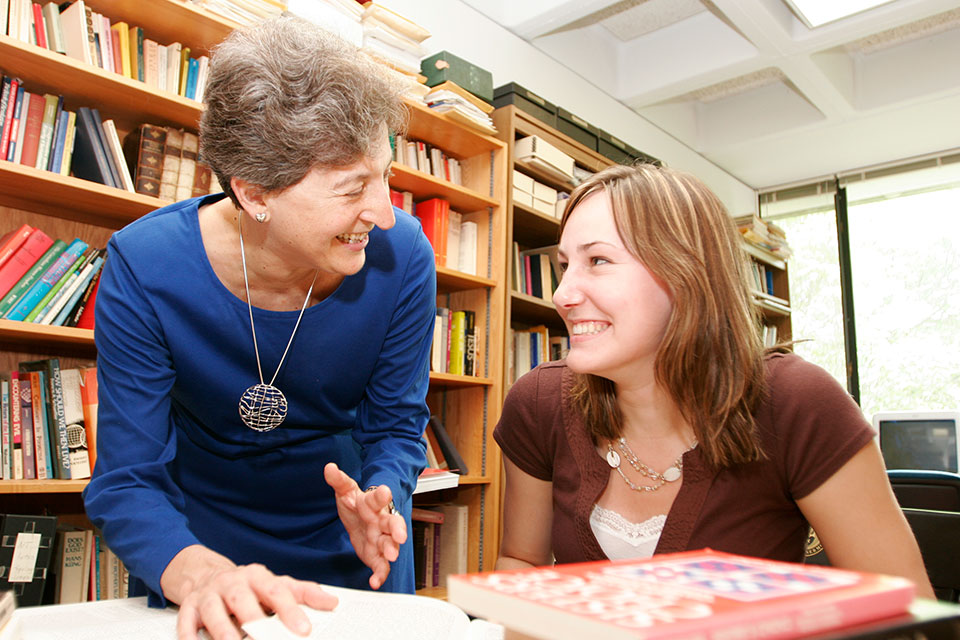Faculty Research

The Department of Near Eastern and Judaic Studies (NEJS) is home to a strong and diverse international faculty whose members research the Bible and Ancient Near East, the modern Middle East, Jewish civilization from its beginnings through historical and contemporary times, Israel studies, Rabbinic Judaism, Christianity and Islam. Our classes are taught on many levels, in disciplines including textual and literary studies, history, social sciences, intellectual history and philosophy, religion and the arts. NEJS classes, with students of all backgrounds, cross the boundaries of historical periods, textual and artistic traditions, religions and civilizations, and highlight the interaction between diverse Jewish, Christian, Muslim and secular cultures.
NEJS faculty reflect diverse religious and intellectual milieus, utilizing multiple disciplines such as critical textual and literary analysis, archival historical detective work, social scientific research, and discussions of artistic expressions. Examples of diverse NEJS faculty research areas illustrate that diversity, including, for example:
-
Magic in ancient cultures (Tzvi Abusch's The Magical Ceremony Maqlu: A Critical Edition was published in 2016 and is the basis of a popular Brandeis class).
-
Jewish life, thought, and culture in Muslim and Christian societies (Jonathan P. Decter's Iberian Jewish Literature: Between al-Andalus and Christian Europe won the 2009 Salo Baron Prize for the Best First Book in Jewish Studies).
-
Religiously-sanctioned slavery (Bernadette Brooten's edited book Beyond Slavery: Overcoming Its Religious and Sexual Legacies exposes the shocking persistence of slavery in numerous societies, work germane to her Feminist Sexual Ethics Project).
-
Israel's legal traditions and the ancient Near Eastern world (David Wright's Inventing God's Law: How the Covenant Code of the Bible Used and Revised the Laws of Hammurabi demonstrates influence from the larger Near East).
-
Jewish connections to both sides in the American Civil War (Jonathan D. Sarna's newest book, When General Grant Expelled the Jews uses archival research to reveal a dramatic but little known chapter in American Jewish history).
-
Mysticism and morality in classical Jewish texts (Reuven Kimelman's books and audio books explore topics like The Hidden Poetry of the Jewish Prayerbook).
-
Sex and the Shtetl—and what we can learn about Jewish marriages in Imperial Russia from state court records (ChaeRan Freeze's ground breaking Jewish Marriage and Divorce in Imperial Russia unearths unexplored resources in the FSU).
-
Changing understandings of pre-war Jewish life in Poland and the Holocaust and its history and impact (Antony Polonsky's 3-volume The Jews in Poland and Russia is just one reason he received an honorary doctorate and two Officer's Crosses from Lithuania and Poland).
-
Central European Jewish intellectuals who reshaped the academy (Eugene Sheppard unpacks influential Jewish thinkers in European and American thought in Leo Strauss and the Politics of Exile: The Making of a Political Philosopher).
-
How a more adequate theory of historical narratives might shape the way students understand history and themselves (Jon A. Levisohn's new book, The Interpretive Virtues: A Philosophical Enquiry into the Teaching and Learning of Historical Narratives argues that the teaching of history ought to cultivate, in students, the virtues of historical interpretation).
-
What studying gender and religion reveals about American Jewish societies (Sylvia Barack Fishman's research shows that Jewish men often designate women to be the signifying Jews, reversing patriarchy but yielding a new imbalance).
-
Museums as resources for understanding religion, history and culture (Ellen Smith pioneers non-textual resources and museums courses for Brandeis.)
-
Hebrew literature and Israeli film and culture illuminate Israeli life (Ilana Szobel's A Poetics of Trauma: The Work of Dahlia Ravikovitch, examines poetry through the lenses of gender, nationalism and trauma theory).
-
The Yiddish press Americanized the Jews (Ellie Kellman's research on fiction reveals the press as a key force in the process of acculturation and Americanization of the immigrant Jewish community.)
-
Israel attracts worldwide attention—and Brandeis attracts worldwide students who study Israel (Ilan Troen's book, Jews and Muslims in the Arab World: Haunted by Pasts Real illustrates why Israel studies are globally compelling; the Schusterman Center and the Brandeis Summer Institute for Israel Studies hosts 160 faculty of all faiths and political perspectives from 18 countries).
“The faculty were challenging, accessible, and supportive: they taught me how to expect the best of myself while giving me the tools to be a serious scholar. I also benefited from and truly enjoyed the opportunities I had to teach in the department. In addition, the sense of community among faculty, staff, and students in NEJS makes it a wonderful place to study. ”